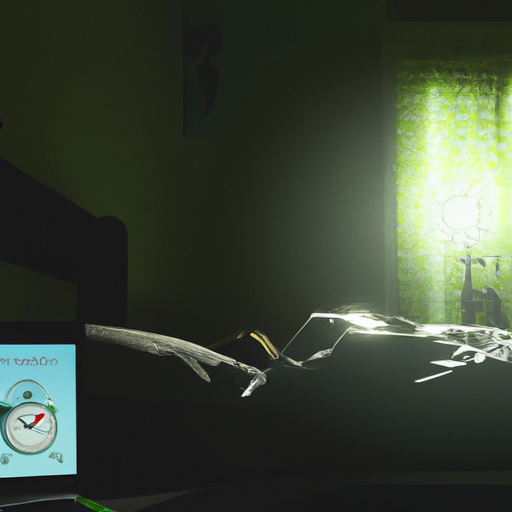How to Create a Sleep Schedule That Works for You
Get the most out of your day and stay healthy with a good night’s sleep. Find out what time you should go to sleep to get the recommended 7-9 hours of sleep for a healthy lifestyle.
Creating a sleep schedule that works for you is an important part of maintaining a healthy lifestyle. A good sleep schedule can help you feel more energized and productive during the day, as well as improve your overall health. Here are some tips to help you create a sleep schedule that works for you.
1. Determine your ideal bedtime. Start by figuring out what time you would like to go to bed each night. Consider your daily activities and how much sleep you need to feel rested. Aim for 7-9 hours of sleep each night.
2. Set a consistent wake-up time. Once you’ve determined your ideal bedtime, set a consistent wake-up time that allows you to get the recommended amount of sleep each night.
3. Stick to your schedule. Once you’ve set your bedtime and wake-up time, try to stick to it as much as possible. This will help your body adjust to the new schedule and make it easier to fall asleep and wake up at the same time each day.
4. Avoid naps. Napping during the day can disrupt your sleep schedule and make it harder to fall asleep at night. If you need a nap, try to limit it to 30 minutes or less and avoid napping after 3 pm.
5. Create a relaxing bedtime routine. Establishing a relaxing bedtime routine can help you wind down and prepare for sleep. This could include taking a warm bath, reading a book, or listening to calming music.
6. Avoid screens before bed. The blue light from screens can disrupt your body’s natural sleep cycle, so try to avoid using phones, tablets, and computers at least an hour before bed.
Creating a sleep schedule that works for you can help you get the restful sleep you need to feel energized and productive during the day. By following these tips, you can create a sleep schedule that works for you and helps you maintain a healthy lifestyle.
The Benefits of Going to Bed Early
Getting a good night’s sleep is essential for physical and mental health. Going to bed early is one of the best ways to ensure that you get the rest you need. Here are some of the benefits of going to bed early.
1. Improved Concentration: Getting enough sleep helps to improve concentration and focus. When you are well-rested, you are better able to concentrate on tasks and remember information.
2. Reduced Stress: Lack of sleep can lead to increased stress levels. Going to bed early can help to reduce stress and improve your overall mood.
3. Improved Physical Health: Getting enough sleep helps to improve physical health. It can help to reduce the risk of heart disease, stroke, and other health problems.
4. Improved Mental Health: Lack of sleep can lead to depression and anxiety. Going to bed early can help to improve mental health and reduce the risk of developing mental health issues.
5. Increased Energy: Getting enough sleep helps to increase energy levels. When you are well-rested, you are better able to tackle tasks and stay productive throughout the day.
Going to bed early is one of the best ways to ensure that you get the rest you need. It can help to improve concentration, reduce stress, improve physical and mental health, and increase energy levels. So, make sure to get to bed early and reap the benefits of a good night’s sleep.
How to Wind Down Before Bedtime
Getting a good night’s sleep is essential for physical and mental health. Winding down before bedtime is an important part of the process. Here are some tips to help you relax and prepare for a restful night’s sleep.
1. Establish a routine. Going to bed and waking up at the same time each day helps to regulate your body’s internal clock.
2. Avoid screens. The blue light emitted from electronic devices can interfere with your body’s natural production of melatonin, a hormone that helps you sleep.
3. Exercise. Regular exercise can help reduce stress and improve sleep quality.
4. Avoid caffeine. Caffeine is a stimulant that can interfere with sleep. Avoid caffeine after lunchtime.
5. Take a warm bath. Taking a warm bath or shower can help relax your body and mind.
6. Read a book. Reading a book can help you relax and take your mind off of the day’s worries.
7. Practice relaxation techniques. Deep breathing, progressive muscle relaxation, and guided imagery are all effective relaxation techniques that can help you wind down before bedtime.
By following these tips, you can help ensure that you get a good night’s sleep and wake up feeling refreshed and energized.
The Impact of Technology on Sleep Quality
Sleep is an essential part of life, and its quality can have a significant impact on our physical and mental health. In recent years, technology has become increasingly pervasive in our lives, and its effects on sleep quality have been widely studied.
The use of technology before bedtime has been linked to poorer sleep quality. The blue light emitted by screens can suppress the production of melatonin, a hormone that helps regulate our sleep-wake cycle. This can make it harder to fall asleep and can lead to shorter sleep duration. Additionally, the content of the technology we use can be stimulating and can make it difficult to relax and wind down before bed.
Technology can also disrupt sleep during the night. Notifications from phones, tablets, and other devices can wake us up and make it difficult to return to sleep. Additionally, the use of technology in the bedroom can be distracting and can lead to longer time spent in bed without actually sleeping.
Finally, technology can have a negative impact on our circadian rhythms. The use of technology late at night can delay our internal clocks, making it harder to wake up in the morning and leading to daytime fatigue.
To ensure good sleep quality, it is important to limit the use of technology before bedtime. This means avoiding screens for at least an hour before bed and avoiding the use of technology in the bedroom. Additionally, it is important to establish a regular sleep schedule and to avoid using technology late at night. By taking these steps, we can ensure that technology does not negatively impact our sleep quality.
Strategies for Overcoming Insomnia and Other Sleep Disorders
Insomnia and other sleep disorders can be difficult to manage, but there are strategies that can help. Here are some tips for overcoming insomnia and other sleep disorders:
1. Establish a consistent sleep schedule. Going to bed and waking up at the same time each day helps to regulate your body’s internal clock and can help you fall asleep more easily.
2. Avoid caffeine, nicotine, and alcohol. These substances can interfere with your sleep and should be avoided in the hours before bedtime.
3. Exercise regularly. Regular exercise can help you sleep better, but avoid exercising too close to bedtime as it can make it harder to fall asleep.
4. Avoid napping during the day. Napping during the day can make it harder to fall asleep at night.
5. Create a relaxing bedtime routine. A relaxing bedtime routine can help you wind down and prepare for sleep. This could include taking a warm bath, reading a book, or listening to calming music.
6. Avoid screens before bed. The blue light from screens can interfere with your body’s natural sleep cycle and make it harder to fall asleep.
7. Seek professional help. If you are having difficulty managing your sleep disorder, it is important to seek professional help. A doctor or sleep specialist can help you identify the underlying cause of your sleep disorder and develop a treatment plan.
By following these tips, you can take steps to improve your sleep and manage your sleep disorder.



















